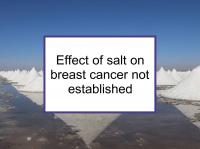Salt (sodium chloride) is a necessity, however U.S. consumers are unlikely ever to be deficient in it. Our diets are heavily loaded with salt, the majority of which is derived from processed food, fast food, and restaurant meals. Increasing salt consumption is correlated with higher blood pressure in the majority of people.
Salt consumption is also suspected of contributing to insulin resistance and metabolic syndrome, which themselves may be associated with increased risk of breast cancer. Consumption of highly salted foods (including fermented soybean products, pickled vegetables, preserved salted vegetables, and salted fish) has also been found to be associated with increased risks of esophageal, ovarian and prostate cancer. Consumption of salted fish has been shown in several studies to increase the risks of nasopharyngeal and colorectal cancers, as well as stomach cancer.
Cancer-related effects of consuming salt
The relationship between salt and cancer is related to two types of salt intake: high overall intake and high intake of very salty foods. The relatively high overall level of salt in the average U.S. diet contributes to cancer risk indirectly by promoting metabolic syndrome and reducing the potassium/sodium ratio in the diet, both of which are thought to increase the risks of various cancers.
The second type of cancer-promoting salt intake occurs when people consume highly salted specialty foods, condiments and snacks. These foods act directly on the digestive track and have been shown in numerous studies to cause stomach (gastric) cancer. Implicated foods include dried and salted fish and seafood, fermented/pickled vegetables, fish sauce, kimchi, salted preserved vegetables, salted and fermented soybean paste, salted fish preserves, salted fish roe, salted meat, salted shrimp paste, salty snacks, and salty soups. Many of the foods listed above are Asian; since the rate of stomach cancer is relatively high in Asia, there has been great interest in investigating the causes. Note however, that European and South American studies also have found associations between heavily salted foods and stomach cancer. There is some evidence that breast cancer survivors are at increased risk of developing stomach cancer and lobular breast cancer survivors in particular are vulnerable to gastric metastases.
Breast cancer-related effects of consuming salt
One study hypothesized that a high salt diet might result in an earlier onset of puberty, which in turn would increase subsequent breast cancer risk. Another study reported that hormone receptor positive (ER+/PR+) and triple negative (ER-/PR-/HER2-) breast cancer cells exerted higher tumorigenicity when exposed to high levels of salt. The same study found that high salt induced resistance to the chemotherapy drug paclitaxel in breast cancer cells. However, it is not clear that a high salt diet would contribute to this effect.
One 2020 study described a mechanism of action by which a high salt diet could promote breast cancer metastasis and accelerate its progression. A 2023 study reported that a high salt diet induced an increase in tumor-initiating stem cells in an animal model of breast cancer, thereby promoting breast cancer progression.
Additional comments
Sodium nitrite and related compounds are routinely added to processed meat and some other salty foods to preserve their freshness and coloring. Sodium nitrite has been shown to react with chemicals in the stomach to produce nitrosamines, which are known to be cancer-promoting. However, the cancer-related effects of salt consumption are not dependent on the presence of sodium nitrite; this carcinogen simply worsens the cancer profile of salty foods that contain it.
Iodine deficiency is a major cause of preventable mental retardation found worldwide. Iodized salt is designed to prevent this deficiency.
Sources of information provided in this webpage
The information above, which is updated continually as new research becomes available, has been developed based solely on the results of academic studies. Clicking on any of the underlined terms will take you to its tag or webpage, which contain more extensive information.
Below are links to recent studies concerning salt. For a more complete list, including less recent studies, please click on salt.
